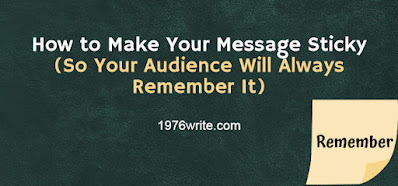Helping the audience to remember what you've written.
What Is It That Makes a Message Truly Noteworthy?
It's funny what you remember and what you don't.
But what is it that makes you really remember things, things you can recall from memory?
The valuable nuggets that you've collected over the years, that have stayed locked inside of your mind. Things like advice, information and language you can recall off the top of your head in an instant.
Psychologists use the acronym SCORE:
- S - Short
- C - Conversational
- O - One-on-One
- R - Relevant
- E - Elevated
How to Make it Stick
Make It Concrete
According to Chip and Dan Heath authors of Made to Stick: Why Some Ideas Survive and Others Die.
Concrete language helps people, especially novices, understand new concepts. Abstraction is the luxury of experts.
The Power of a Metaphor
Metaphors allow the reader to see and feel the ideas presented.
Metaphors compare something new to something more familiar, making abstract ideas more memorable and easy to understand.
SUCCESs - 6 Principles to Making a Message Sticky
The above acronym was created by Chip and Dan Heath to show the formula of making a message sticky.
Simple
To make something really simple you need to strip it right down to only what's necessary. A great example this can be found in The Golden Rule, a simple example of a message so profound you could spend your whole life deliberating over it.
In order to make this work you need to get to the essence of your message.
You can apply this principle by:
- Start with the most valuable and compelling information first.
- Only give away your most interesting information, don't be tempted to give everything you know away at once.
- Use concepts and ideas already known to your audience to build a picture people will understand.
Unexpected
Now that you've got your reader's attention you need to grab their attention.
Breaking away from the mundane and usual information people have heard, instead providing something completely counterintuitive to what people would expect.
You can apply this principle by:
- Presenting something that is counter to common sense, but makes sense.
- Keeping your audience interested using mystery to draw them in. This can be done by setting up questions like: Why isn't it common knowledge already? Are there any unexpected outcomes? Conveying your message so that it shatters your reader's perception, helping them understand your information more easily.
- Create a knowledge gap so that the audience will want to discover the outcome.
Concrete
Much information is lost in communication because it becomes too abstract for the human mind to comprehend.
That's why our minds are only wired to understand what's concrete and factual.
Image your brain is like a piece of velcro with thousands of tiny loops, each loop ready to grasp as many hooks as possible to help you remember.
You can apply this principle by:
- Making sure that your ideas correlate with what your audience already knows.
- Staying clear of fancy jargon, using simple terms to put over your message.
- Using abstract concepts, and real-life examples to get your point across.
Credible
Even though your audience is reading your text it doesn't mean they'll necessarily believe what you've written down. That's why it's crucial to be credible.
Credibility comes in two forms; Expert credibility comes from people in authority, celebrities. Then there's internal credibility where its planted within your message.
You also get credibility from things like statistics, specific details and testable credentials where an audience is asked "to see for themselves."
Emotional
So you're audience is reading your text intently, question is do they really care about what you're talking about?
There are a few different ways to make your message emotional:
People are rational and self-interested, so in order to lure them in you make a fervent appeal to their emotions.
People like things that will benefit them in the long run, this is because they look out for their own interests.
A good example of self-interest is when charities that include children in their advertising become more appealing to donate to, than a charity looking to end hunger.
Stories
Mental simulation is a useful tool, and usually comes in the form of a story. In other words, a person can see your message mentally through storytelling, as to what your message concerns.
Allow your readers to combat doubt and see new possibilities and opportunities. Leaving arguments open for people to judge, debate and criticise.
In Conclusion
To make your message really sticky it should make your readers:
- Take heed.
- Learn and remember it.
- Trust it.
- Act on it.
Please share this post with your friends!
Read more:



No comments:
Post a Comment
Tell me your thoughts.